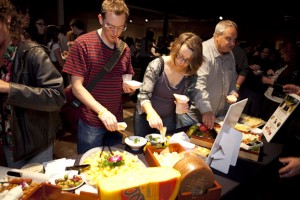Editor’s Note: In Part 1 of our Chicago Film Fest coverage, Robert Rodi pondered the parallel universe of film and food as interpreted by the Food Film Festival. It included a lot of deep frying and cucumber essence. To make sense of this, refer back to the article.
Jeffrey and I are now adequately fortified and ready for the second half.
Next up was “Mr. Okra,” TG Herrington’s profile of Arthur Robins, a local celebrity in New Orleans’ 9th Ward. Robins—or Mr. Okra as he’s colloquially known—sells produce from his rolling farmstand/pickup truck, which is covered with aphorisms and maxims rendered in bright tempera paint. Robins—a globe-shaped man whose front teeth are more a concept than a reality—is introduced as he makes his rounds, barking his wares over a loudspeaker in cadences that roll back the centuries—with a sliver of modern-day road rage to tether him to our own: “I have ORanges and baNAnas…I have CAAAUliflower…I have CAAAAN-te-loupe…I have—Where the shit he goin’ in a hurry?”
Robins is a genial, engaging presence as we follow him through his day, extolling the virtues of fresh produce and lamenting the disappearance of local markets (he glumly walks us through the legendary French Market, which seems now entirely given over to tourist crap). But his toothlessness, combined with the less-than-ideal acoustics in the screening room and my back-row seat, made it difficult to understand much of what he says. All the same, he charmed me; and not me alone—as this film was the Audience Choice Award winner at last year’s New York festival.
Romancing the Oyster
The perfect contrast to Mr. Okra’s southern street-level urbanity is the east-coast Brahmanism of Brent Petkau, an oyster connoisseur who’s profiled in Craig Noble’s brief (six minute) “The Perfect Oyster.” Petkau, who looks something like late-period Sean Connery and sounds like Dick Cavett’s baritone uncle, doesn’t just love oysters…he looooves them, and despite the film taking place entirely out of doors, in chill, wet weather on a gunmetal-gray stretch of British Columbia coastline, Petkau—on his hands and knees selecting prize specimens from the shoals—gives the whole endeavor an unabashed air of bedroom. “It’s like a crescendo,” he coos of his favorite bivalve. “As a life force, it wants to be sucked back,” and with that, he happily obliges.
Having warmed us up, he brings the erotic associations from teasing metaphors right up to the front burner, gently prodding one oyster’s glistening, almost labial folds with the tip of a knife while crooning that it’s “wild one minute…the next it’s very calm and nurturing and loving…a great oyster responds to that kind of love.” The women in the audience howled, but watching Petkau contentedly wash down his haul with a glass of white wine, I got the impression he does all right with the ladies. He’s a grizzled old man with a beard the size of a rat terrier and he probably smells like brine, but he has a voice like chocolate and everything he says is tinged with a seductive wink. Yeah, I bet he does just fiiiine.
There weren’t any audience handouts after these last two films, Mr. Okra’s wares having been represented by a carrot and beet julienne distributed before the curtain, and Petkau’s likewise by a sample table run by an esteemed local seafood place, Shaw’s Crab House (and from which, as noted above, I’d already indulged). We were assured, however, that the oysters thus served had come from within twenty miles of those among which we’d just seen Petkau cavorting.
From Petkau’s heights of exaltation we come to the stripped-down “Celeriac,” John D. Reilly’s brief (two-and-a-half minutes) thriller starring a man, a book, a stalk of celery, and a knife. It’s a clever little exercise in the power of film; it’s also a classic illustration of tension and release…or, in culinary terms, a palate cleanser. No celery was served after its conclusion, but really, that was just fine.
Thank God, There’s Pie
Having rinsed our sensations clean with a frisson of fear, the program now offered up some slabs of comfort…and a comforting local presence as well. “Pie As a Lifestyle”—one of Michael Gebert’s “Sky Full of Bacon” podcasts—profiles Chicago’s very own Paula Haney and her pie shop, Hoosier Mama.
That sassy, tongue-in-cheek name might lead you to expect a more colorful proprietress; but in fact Haney is a very serious entrepreneur, and what she takes seriously is culinary history as social history. We meet her as she and her staff are hard at it whipping up an inventory of pies for fall—pear, pumpkin, Dutch apple—but in cutaway interviews Haney waxes rhapsodic on her own gustatory awakening. “When you grow up in Indianapolis, every place is exotic; but when you really look at it, French food—cassoulets and so on—is poor food. It’s what people made to survive.” This has turned Haney into a kind of archivist, reviving a whole class of what she calls “desperation pies”—originally made with whatever ingredients were left on hand whenever fruit went scarce (like the intriguingly named Vinegar Chess, about which we don’t learn much more than the name).
She illustrates with the Hoosier Sugar Cream Pie, a very old recipe designed to be made quickly so as to allow the baker to get back out into the fields. Its ingredients (basically sugar and cream) were even stirred by hand to preclude any extraneous washing up (though Haney hastens to add that she and her staff use mixing utensils). The 1950s-era cookbook in which Haney found the recipe treats it as an oddity and even advises against making it—which is of course exactly why Haney did. (Each audience member got a slice after the video. It was delicate and delicious, with a texture like silk.)
“You can’t eat pie while you drive, you can’t have it on the go, you have to sit down and have it with a cup of coffee…there’s a pie lifestyle.”
In her enormous pink sweater (seemingly chosen for a woman twice her size, as though she assumed she’d gain weight plying her trade and never did), the fresh-faced Haney (who was present, and made a few brief comments after the film) doesn’t come off as a revolutionary, and in fact she sums up her thoughts with the kind of homey aphorisms we’ve come to expect on the subject of pie. “You can’t eat pie while you drive, you can’t have it on the go, you have to sit down and have it with a cup of coffee…there’s a pie lifestyle.”
An Ice Cream Finale
The program closed with Orrin Zucker’s “The Death & Life of Ice Cream,” a three-minute study of various kinds of frozen desserts melting. There are cones, cakes, pies, dreamsicles, you name it, and all they turn into glamorous goo before your eyes. There are probably a number of Zen-like takeaways from this kind of spectacle—say, on the transience of beauty or the leavening power of time—but by now we were all pretty tired, and besides we knew there was ice cream coming. It came in little paper tubs and it was pumpkin. Fine, then. That’s a wrap.
In the end, then, what was the victor? Did film dominate, or food…? I have to say, at the actual event, food won, hands down. The awareness of actual edibles just waiting in the wings for the films to end, made the films—even at twelve minutes or under—seem nearly interminable; and the immense satisfaction of taking my share from the delicacies distributed far outweighed any enjoyment I derived from the entertainment.

However…two weeks later, it’s the films that resonate. The outsize personalities, like Phil Wesson, Brent Petkau, John Nese, and Mr. Okra, are lodged firmly in my mind, and aren’t going anywhere soon. I’ve even Googled some of them, and got to know them better. So while Food won the fifty-yard dash, Film wins the marathon.
With one exception: I have not been able to get Mr. Q Cumber out of my head. I would drink that stuff every damn day. In fact I think I’d sell one of my dogs for a tall, cool glass right at this moment. Damn you, Coke and Pepsi. Damn you both to the depths of perdition.


Attention: Robert Rodi
Re: NYC Food Film Festival and review of “The Perfect Oyster”
Nice blog review of short documentary, “The Perfect Oyster”. But hey, when does one enter the category of “old”? as referred to in your article? Hmmm, at 52, I’m just starting to get into my prime as a bon vivant and oysterman. In fact, I distrust anyone who is not near their 50’s for the simple reason that to live well, wisely and with flair, it takes time and age……. to get better, even perfect does it not?
I’d love to stay in touch with Toque. Very nice food site.
I’d gladly chat at greater length and serve as a resource person concerning the topic of shellfish and the revolutionary concept of “Making the World EVERYBODY’S OYSTER”.
Better yet, please come for a visit to my oyster ranch on Cortes Island B.C. The Perfect Oyster movie was but a tease of what goes on at my oyster ranch.
Visit my site if you like: http://www.theoysterman.com
Cheers and oysterly yours, Brent